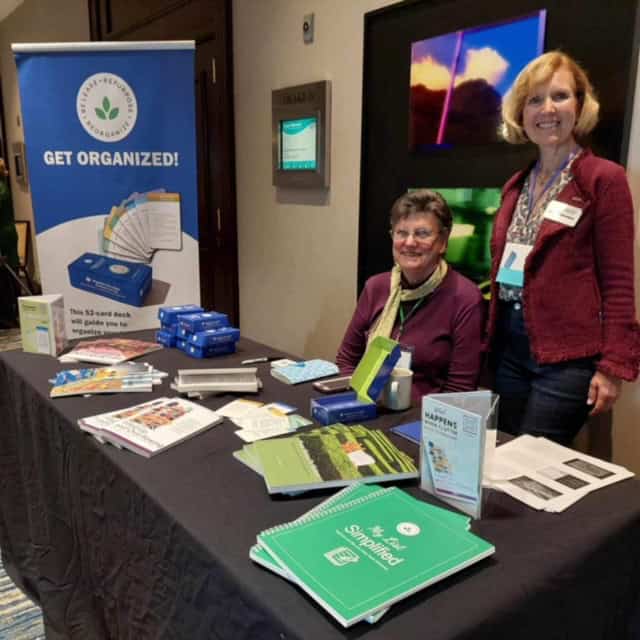
Recently I spent the better part of the week with (as one person said) frolleagues – friends who are also colleagues. We were all attending the 2023 conference with the Institute for Challenging Disorganization® in Waltham, Massachusetts at the Embassy Suites. In the interest of transparency, I helped to organize the conference with Kim Cox. It was a wonderful event! I participated in many great conversations, shared warm hugs, and received terrific education. I want to give you my reasons to attend the ICD® conference.
There are several things to know about the ICD® conference in general. There is one session per time slot. Everyone attends the same session. This gives you natural things to talk about with anyone you encounter, friend or soon to be friend. The topics all relate back to chronic disorganization in one way or another as this is the mission of ICD®; to provide education, research, and strategies to benefit people challenged by chronic disorganization. (Taken from the ICD website).
The organizers intentionally keep the conference on the small side of things so that it feels like you can approach anyone and everyone. Every conference has a different theme. The theme for the 2023 ICD® conference was Grow Your Mindset with ICD®.
Participate in 7 sessions over 2 days
When you attend the ICD® conference, prepare to have your mind blown away by the level of education. Our goal as conference organizers is to provide our attendees with top level graduate education which is intended to further the organizer’s understanding of the topic at hand. Sometimes you come away with actionable steps to take with your clients. Other sessions provide you with a deeper understanding of the challenges your clients may face.
This past year there were 7 unique presentations. There were 4 on Friday and 3 on Saturday. The conference ended around 4pm on Saturday giving participants time to catch an evening flight so they can spend Sunday at home.
We opened our conference Thursday late afternoon with a surprise presentation from the organizing thought leader, Judith Kolberg. Judith is one of the founding members of ICD® although it was then called the National Study Group on Chronic Disorganization. In fact, she is the one who first coined the expression: Chronic Disorganization.
Make frolleagues when you attend the ICD® Conference
ICD® is a global organization and as such attracts organizers and related professionals from many different countries around the world. This year I was fortunate to meet someone from Romania, from Greece, and reconnected with organizers from England, The Netherlands, Canada, and Mexico to name a few countries.
These professionals quickly become friends and colleagues. We have much in common. Even though our cultures are different, we encounter similar challenges when working with clients with brain-based conditions like ADHD, Autism, or Hoarding tendencies.
I love listening to frolleagues talk about the strategies they use in their work as well as sharing some strategies I employ.
Fabulous presentations from experts in their fields
There are too many fabulous takeaways to even begin to list them all here. Since I want to give you a sample, I am going to give you some small takeaways from each of the 7 presentations.
Judith Kolberg: As a small business owner you need to be ready to pivot. Keep your mind open to other revenue streams such as virtual organizing, blogging, or coaching.
Beth Nolan, Ph.D. (Communication and Dementia) When working with a person challenged by Dementia remember they are still the person they always have been. See if you can learn about their personal preferences. Work with them to find things you can agree on.
David Tolin, Ph.D. (Hoarding: Chasing a New Diagnosis Through Brain, Body, and Behavior) It was very exciting to learn new statistics related to the Hoarding Disorder. It was also interesting to learn that CBT does not create lasting change in behavior and new theories for treatment are being investigated.
Devon Price, Ph.D. (Rethinking Pathological Demand Avoidance: Lack of Ability or Act of Protest) It is best to say ‘Autistic person’ rather than challenged by autism. Another way to think about PDA is Persistent Drive for Autonomy. Perhaps the demands or what is being asked of the person is the problem.
Linda Roggli (Tip of the Iceberg: Digging Deeper to Bolster Your ADHD Female Clients) Rejection Sensitive Dysphoria is something to be aware of and on the look out for. We need to be hyper aware of our tone of voice and body language, so we don’t inadvertently signal rejection or dissatisfaction with something the client has done – or not done.
Alicia Clark, Ph. D. (Anxiety into Action: How to Help the Chronically Disorganized Take Control) Anxiety has a volume curve. We need to be sensitive to the level of anxiety our client is facing and try to keep their anxiety at the top of the curve or at the ‘chatter’ level.
Time Management Panel with Sara Skillen, Cena Block, Ellen Faye, and Cindy Sullivan This was a wonderful panel discussion with each of the panelists describing their strategies for working with clients to manage their time better.
Leslie Hatch Gail, Ph.D. (From Deficit to Capacity: An Asset Based Approach to Challenging Disorganization) This focuses on what is working well for the client. Helping them to acknowledge and work with their strengths to achieve the best outcome.
In Conclusion:
The ICD® Conference is one I hope never to miss. The opportunity to make connections with like-minded professionals (professional organizers, therapists, social workers) is one of the three reasons to make the effort to be there in-person. The atmosphere is one of collaboration and cooperation as we all sit and learn together from experts in their fields. If you’ve never been to an ICD® conference maybe this little review will push you to attend the ICD® Conference in 2024.
Diane N. Quintana is an ICD® Master Trainer, Certified Professional Organizer in Chronic Disorganization®, Certified Professional Organizer®, owner of DNQ Solutions, LLC and co-owner of Release Repurpose Reorganize LLC based in Atlanta, Georgia.


Thanks so much for sharing all this great informations, this is wonderful to be a part of it..
Wow this just sounds so great. I know I would love it. I want to plan to go for next year. I believe a few from my area attend as well. Thanks for your recap.
Thank you, Kim. Yes, I know quite a few from your area were there. Maybe you’ll join us in 2024?
I love the quote from Judith Kolberg! Many of my clients, as well as myself, have pivoted over the years in our respective small businesses. After reading your post, I visited the ICD website. Thank you!
It sounds like you were a part of delivering a fantastic conference. ICD has an incredible reputation, and this conference always delivers wonderful content. I love that everyone attends all the sessions, allowing attendees to really process each session with one another. I’ve been seeing feedback from others who attended and I’m feeling lucky to be learning, even though I couldn’t be there!
Diane- Thank you so much for chairing this conference with Kim Cox and also for being a conference sponsor (with Jonda.) What a fantastic conference! I missed being in person together. Real-time hugs, smiles, and conversations were the best!
I love the term “frolleagues,” which is new to me. That is exactly how it feels- our peeps are friends AND colleagues. How lucky are we?
Your summaries and takeaways from each session are brilliant. Like you, this week I wrote about attending the conference. I had a difficult time distilling each session down to a few sentences. I appreciate how you did that.
There is something so special about attending all sessions together. It becomes an integrated group journey. As you said, it gives us tons to talk about. I can’t wait for next year in Minneapolis!!!
You nailed it! I am sharing some new information about autism that I got from the conference with a client this morning.
What a fabulous recap. Although I’ve attended 19 NAPO conferences, I’m not an ICD subscriber and haven’t attended any of those, but it always sounds wonderful. I didn’t know that there were no competing sessions; I love the idea of everyone attending the same ones. I had just finished up with a client the Thursday your conference started when my phone blew up with texts, starting with Sara Skillen and Ellen Faye, sending me photos of Judith and her slide mentioning a post of mine. That was quite a surprise, and really made me wish I were there with all of you to get a greater sense of the context, which you’ve supplied.
In particularly, some of this content really resonated. I’m so intrigued by “Rethinking Pathological Demand Avoidance: Lack of Ability or Act of Protest” because, although we’re always hearing about the importance of person-first language, my friends who report being on the autism spectrum uniformly tell me they prefer “autistic person,” much like I prefer being called a diabetic or diabetic person rather than a person with (or challenged by) diabetes. The term “pathological demand avoidance” is one with which I’m only tangentially familiar, so I’m headed off to learn more!
I’ve only just begun to learn about Rejection Sensitive Dysphoria in recent months, and Dr. Tolin’s discussion of CBT sounds fascinating, too. I’m completely envious. Thank you for sharing all of this! You (and Kim Cox) obviously did a remarkable job putting this conference together. Brava!